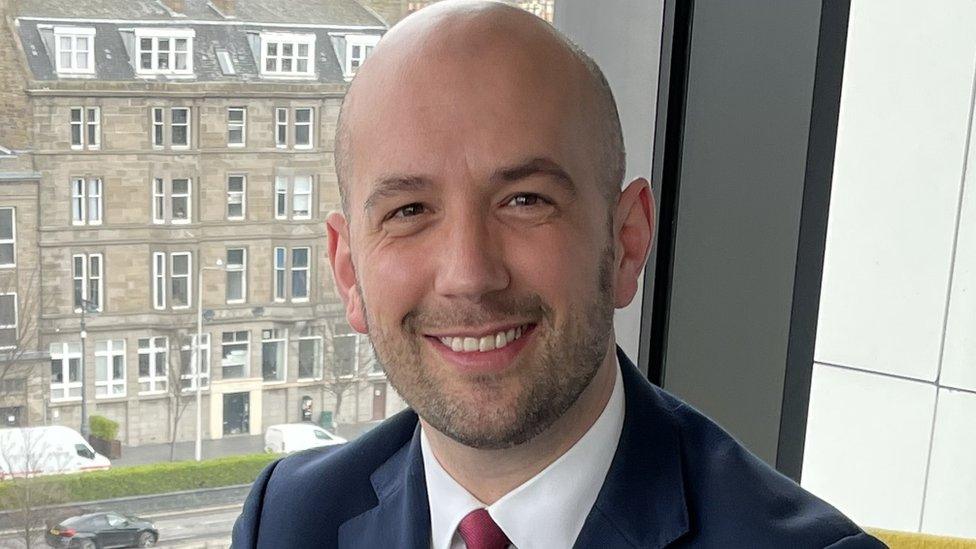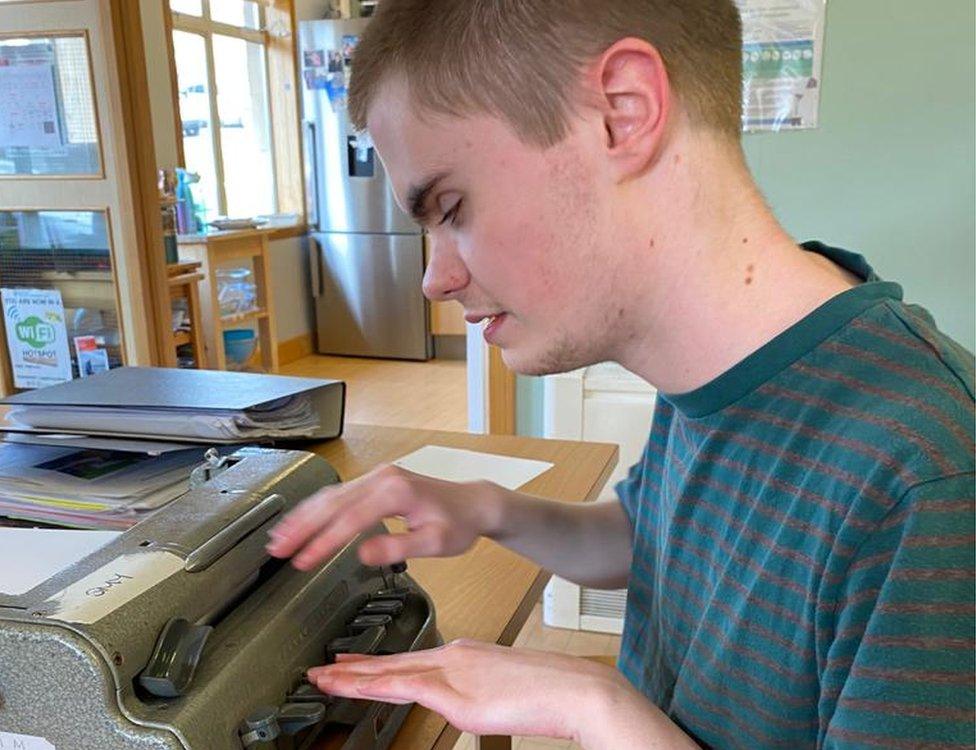Lifelong disabilities will not face benefit tests
- Published

Colette Walker, who is registered blind, claimed she was ridiculed in an assessment centre
Disabled people in Scotland with serious lifelong conditions will no longer have to attend reassessments to continue receiving their benefits, BBC Scotland has learned.
The Scottish government will begin taking over adult disability benefits from the UK government next week.
Currently, people with lifelong conditions such as being blind have to be reassessed to keep their benefits.
The Scottish government said it would have a more "compassionate" approach.
The pilot for the new payment will begin in Dundee, the Western Isles and Perth and Kinross from 21 March.
People already receiving Personal Independence Payment (PIP) and Disability Living Allowance (DLA) from the UK Government's Department for Work and Pensions do not need to apply for the new payment from Social Security Scotland.

Social Security Minister Ben Macpherson said changes would be made to assessment
They will be automatically transferred on to the new system from the summer, the Scottish government's social security minister Ben Macpherson said.
He said the new Adult Disability Payment would make a number of changes to assessment.
Mr Macpherson said: "If they have a disability or a long-term health condition that is unlikely to change, we are looking to provide indefinite awards, which means that people will not need to reapply for their benefit or be reviewed."
Other major changes include providing short-term financial assistance to people awaiting appeals, and changing the criteria for terminal illness so that anyone with a terminal diagnosis will be eligible for the benefit.
Under current rules, terminally ill people are only eligible for PIP if their death is "reasonably expected" within six months.
Mr Macpherson also pledged that the Scottish system will not ask claimants to undergo "undignified physical and mental assessments" and will remove the private sector from the process entirely.
And he has announced that six social security benefits are to be increased by 6% from 1 April.
The move will affect the Job Start Payment, Young Carer's Grant, Funeral Support, Best Start Grant and Carer's Allowance Supplement - which had been due to increase by 3.1%.
It also covers Child Winter Heating Assistance, which was to rise by 5%.

'There was no reason for him to go to a face-to-face assessment'

Colette Walker's son Ciaran, who is totally blind and non-verbal, was ordered to attend a face-to-face assessment
Colette Walker, who is registered blind but had to attend reassessments to keep her benefits, said she welcomed the change in approach.
She said her benefits were taken away from her for several months and she had to "fight" to get them back and attend assessments which "had no bearing on a visual impairment basis".
"For me to be ridiculed in an assessment centre to do star jumps and touch my toes and kind of walk 50 yards, that's just inhumane," she told BBC Scotland.
Colette also faced problems when her son Ciaran, who is totally blind and non-verbal, was ordered to attend a face-to-face assessment in order to receive his benefits.
"He doesn't have eyes anymore, so there's actually no way he will ever get to see again, so there was no reason for him to go to a face-to-face assessment," she said.
"I would rather my son had his sight and was able to live a full life, be able to see in this world, and not have the £500."

Huge change
Disability groups like MS Society Scotland and Inclusion Scotland have welcomed the changes.
Citizens Advice Scotland has also said it welcomes the new payment, describing it as a "huge change from what came before" because it "simplifies the claims process" and "medical assessments will be a last resort".
But policy manager Stephanie Millar said a potential challenge could be that the benefit itself is "largely replicating PIP and uses the same points process that PIP uses".
"So the process will be more straightforward but they're still working within a system which does disadvantage claimants," she said.
The new payment has also come under criticism by some opposition parties.
Scottish Labour's social security spokeswoman, Pam Duncan-Glancy, said the Scottish government has "missed an opportunity" to improve the lives of disabled people, and said the new payment criteria would "be the same as it is under DWP".
"No-one wants devolution to deliver DWP-light," she said. "We want a shake-up of the whole thing."
'Strong cooperation'
A DWP spokesperson told BBC Scotland that star jumps were "definitely not a component" of their examination process.
"We support millions of people every year and our priority is they get the benefits to which they are entitled as soon as possible, and to ensure they receive a supportive and compassionate service," they said.
"Award rates and durations are based on individual circumstances and needs, and the likelihood of those needs changing.
"For PIP they can vary from nine months to an ongoing award, with a light touch review after 10 years.
"Reviews are a key feature of the benefit and ensure that payments accurately match the current needs of claimants."
Meanwhile, Scottish Secretary Alister Jack has signed a Scotland Act Order to support the roll out of the Adult Disability Payment.
He said this would make sure disabled people in Scotland are treated equally to those in other parts of the UK in a range of reserved areas, including tax and voting rights.
Mr Jack added: "This is another great example of our work to support the devolution settlement, highlighting the strong cooperation between the UK and Scottish governments."